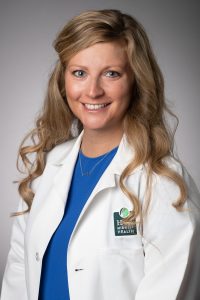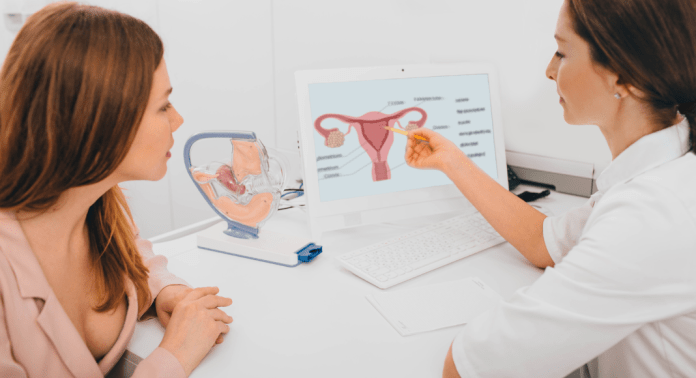This post is written and sponsored by HCA Midwest Health.
For you and I, a well-woman visit is likely a routine event we check off our to-do list every year. But visiting the gynecologist for the first time can be stressful, particularly as a teen.
The mere thought of going to a gynecologist may fill your daughter with embarrassment or anxiety. As an OB/GYN, I want to help calm both your nerves as you approach either talking about or making that first OB/GYN appointment together. We are just as invested in making your teen feel comfortable as you are.
What is the right age for my daughter to have her first exam?
We usually recommend that a girl’s first gynecology exam take place between the ages of 13 and 15, depending on when she starts her first menstrual cycle. The American College of Obstetricians and Gynecologists (ACOG) recommends the same thing. We would like to develop a healthcare home for young women as soon possible in order to monitor her for signs of abnormal development or common issues like menstrual irregularity, cramps, pelvic pain and even ovarian cysts.
How do I find the right doctor?
The first step is finding an OB/GYN for your child. Parents can get a recommendation from their child’s pediatrician or bring their daughter to their own OB/GYN. This is also a good time to involve your daughter in the healthcare decision. Ask your daughter what type of healthcare provider she would prefer:
- Male or female? Younger or older?
- Would she like to stick with the pediatrician or family doctor she has seen before (if they provide women’s health care) or see someone new?
- Would she like to see the same person as you, or does she prefer to confide in someone who has no connection with you?
How do I explain why this visit is important?
There are three main points you can highlight as to why it’s important to start regular well-woman checkups.
- Asking questions – We are a great resource for asking any and all questions related to a woman’s body. If your daughter has questions she is uncomfortable discussing with you about her cycles, birth control, sex or her developing body, an OB/GYN can provide accurate answers.
- Monitoring health – Even if your daughter doesn’t have any abnormal cycles or symptoms now, it’s a good idea for us to monitor her for signs of abnormal development or common issues like polycystic ovarian syndrome. We can diagnose and treat problems such as pelvic or stomach pain.
- Preventing disease – We will teach your daughter how to perform regular breast exams to watch for signs of cancer and also talk about sexually transmitted diseases.
How do I alleviate embarrassment?
Depending on your teen, she may be very embarrassed about the topics the doctor will raise, her physical appearance or someone she doesn’t know seeing her without clothes. That’s all normal, we work hard to relieve that embarrassment and set the stage to talk openly with your teen.
I tell my patients there is nothing to be embarrassed about. My job is to educate and care for patients and not to judge. The more honest a patient is during our visit, the more she will get out of it.
What will happen during the first visit to the OB/GYN?
Your daughter may feel nervous, embarrassed or scared about her first visit, so you’ll want to reassure her and let her know what to expect. Depending on age and concerns, the visit may just be a talk with the doctor. If needed, a general physical and external genital exam may be performed. It’s also good for her to know that her doctor may do a breast exam and ask her about her health history and menstrual cycle.
Many times, a pelvic exam will not be needed but it’s still important to understand what it is. Let her know the exam won’t be painful but may be uncomfortable. Before the exam, give your daughter a sense of what will happen. She should know what to expect and why the doctor is doing it. If you are both comfortable with the idea, consider letting your daughter see these steps firsthand by sitting in on one of your exams.
Basic checks. This is similar to the check at your pediatrician’s office. We will measure things like your daughter’s weight, heart rate and blood pressure.
The breast exam. Breast cancer is very rare in teens. But the breast exam is still an important part of the visit. We want to make sure that your daughter is developing well and to check lumps, cysts or breast problems.
The external examination. We will ask that your daughter undress and put on a gown. Her pelvis and thighs will be draped with a sheet. She may be asked to lie on the table with her knees bent and spread apart. The doctor may have her place her feet in stirrups. In this position, we check the external genitalia to make sure there are no sores, swelling or any other problems.
The internal exam or pelvic exam. If a pelvic exam is needed, the doctor will place one hand on the outside of your daughter’s belly and one or two fingers inside the vagina. This way we can feel the size and position of the ovaries and uterus.
The Pap smear. We usually recommend a Pap smear starting at age 21 and then every three years for women in their 20s. The Pap smear is the screening test for cervical cancer. In this test, the doctor gently collects cells from the cervix using a small brush. The sample is checked in a lab for cell changes and cervical dysplasia.
The provider may ask if your daughter got the human papillomavirus (HPV) vaccine at her pediatrician’s office. If she didn’t, they might offer it. This vaccine protects against the main types of HPV that cause genital warts and some types of cancer, especially cervical cancer. Even if your daughter gets the HPV vaccine, she should still get regular Pap smears starting at age 21 to screen for cervical cancer.
Hang in there! This may be overwhelming for you, too. I hope this helps you have an open conversation with your daughter. I also hope your daughter develops a relationship with her gynecologist, so that she is comfortable sharing personal information in the future. Don’t forget to lead by example and schedule your own well woman visit.
 Dr. Sara Talken, is a board-certified OB/GYN with Specialists in Women’s Care – a part of HCA Midwest Health.
Dr. Sara Talken, is a board-certified OB/GYN with Specialists in Women’s Care – a part of HCA Midwest Health.
Healthcare is self care. Whether you’re looking to establish a relationship with a gynecologist, experiencing female-related issues, looking for contraception advice, or planning to expand your family, our obstetrician gynecologists have the expertise to help. Find an OB/GYN at mymidwestphysician.com/gyn.

















